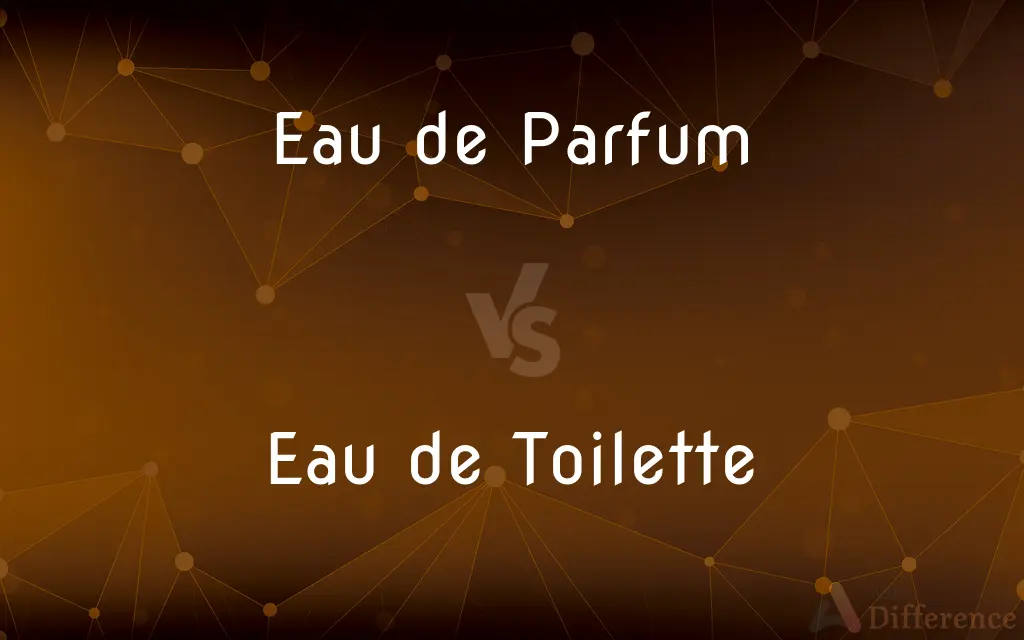Eau de Parfum vs. Eau de Toilette — What's the Difference?
By Tayyaba Rehman & Urooj Arif — Published on February 24, 2024
Eau de Parfum (EdP) contains a higher concentration of fragrance oils, typically 15-20%, offering a longer-lasting scent, whereas Eau de Toilette (EdT) has a lighter concentration, about 5-15%, making it more suitable for everyday wear.

Difference Between Eau de Parfum and Eau de Toilette
Table of Contents
ADVERTISEMENT
Key Differences
Eau de Parfum and Eau de Toilette are two of the most common types of fragrances, distinguished mainly by their concentration of aromatic oils. EdP, with its higher concentration of fragrance oils, not only provides a richer scent but also lasts longer on the skin, often making it a preferred choice for evening wear or special occasions. The intensity and longevity of EdP can vary, with some scents lasting up to 8 hours or more, depending on the composition and the wearer's skin chemistry.
EdT offers a lighter, in contrast is more refreshing scent that is ideal for daytime use. Its lower concentration of oils means that it is less overpowering and may need to be reapplied throughout the day to maintain its presence. This makes EdT a more subtle choice, suitable for work environments or when a less intense fragrance is desired.
The choice between EdP and EdT often comes down to personal preference, the occasion, and the weather. In warmer climates or seasons, an EdT might be preferable due to its lighter nature, while EdP can be more appealing in cooler conditions, as it can provide a warming effect with its depth and longevity.
Price is another factor that differentiates EdP from EdT. Typically, Eau de Parfum is more expensive due to its higher concentration of fragrance oils. However, the cost per wear can be comparable, as EdP's longevity may require less frequent application than EdT.
Both EdP and EdT offer their unique advantages, while the choice between them depends on the individual's scent preferences, the setting in which the fragrance will be worn, and the desired longevity of the scent.
ADVERTISEMENT
Comparison Chart
Fragrance Concentration
15-20%
5-15%
Longevity
Longer-lasting, up to 8 hours or more
Lighter, may need reapplication
Ideal Use
Evening wear, special occasions
Everyday wear, daytime
Intensity
Richer, more intense scent
Lighter, more refreshing scent
Price
Generally more expensive
More affordable
Seasonal Preference
Cooler months
Warmer months
Application Frequency
Less frequent, due to longevity
May require more frequent application
Compare with Definitions
Eau de Parfum
Suited for evening wear and cooler weather.
In the winter, he switches to Eau de Parfum for its warmth and persistence.
Eau de Toilette
Preferred for its refreshing and less overpowering scent.
After his workout, a quick spritz of Eau de Toilette refreshes him instantly.
Eau de Parfum
Requires less frequent application due to its longevity.
A single application of Eau de Parfum suffices for her entire day.
Eau de Toilette
A lighter fragrance option with a moderate concentration of oils.
For daily wear to the office, she chooses Eau de Toilette for its subtlety.
Eau de Parfum
Ideal for those seeking a pronounced and long-lasting aroma.
His Eau de Parfum leaves a memorable scent trail.
Eau de Toilette
More affordable, making it accessible for regular use.
The Eau de Toilette is budget-friendly, allowing him to explore different scents.
Eau de Parfum
Typically more expensive, reflecting its higher oil content.
The price of her Eau de Parfum reflects its premium quality.
Eau de Toilette
May require reapplication to maintain its presence.
She keeps a small bottle of her Eau de Toilette at work for touch-ups.
Eau de Parfum
A fragrance type with a high concentration of aromatic oils, offering lasting scent.
She prefers Eau de Parfum for its enduring fragrance during long events.
Eau de Toilette
Offers a fresh scent that's ideal for daytime and warmer seasons.
His summer fragrance is an invigorating citrus Eau de Toilette.
Common Curiosities
How should I decide between EdP and EdT?
Consider the occasion, the climate, and whether you prefer a subtle or more noticeable fragrance.
Does Eau de Parfum last longer on clothes or skin?
Eau de Parfum can last long on both, but it often has a more extended longevity on clothes.
Why is Eau de Parfum more expensive than Eau de Toilette?
The higher concentration of fragrance oils in Eau de Parfum accounts for its higher price.
How can I make my Eau de Toilette last longer?
Applying to pulse points and moisturized skin can help prolong the fragrance.
Can Eau de Parfum be worn during the day?
Yes, while richer, Eau de Parfum can be worn during the day, especially if applied sparingly.
Will Eau de Toilette irritate sensitive skin?
Any fragrance can irritate sensitive skin, but products with lower alcohol content, like EdP, might be less drying.
Can Eau de Toilette be used as a room spray?
While not its intended use, some may use it lightly as a room spray.
Is Eau de Toilette only for men?
No, Eau de Toilette is suitable for both men and women, depending on the fragrance.
Can I layer Eau de Toilette over Eau de Parfum?
While not common, layering fragrances can create a unique scent profile if the fragrances complement each other.
Does the longevity of a fragrance depend on skin type?
Yes, fragrance longevity can vary based on skin type, with dry skin typically absorbing scent faster.
Is it worth having both EdP and EdT versions of a fragrance?
Yes, having both allows you to choose based on the season, occasion, or time of day.
How do I store my fragrances to maintain their quality?
Store in a cool, dry place away from direct sunlight to preserve their integrity.
How much fragrance should I apply?
Start with a small amount; you can always add more, but it's difficult to remove excess.
Are there occasions when Eau de Toilette is preferable to Eau de Parfum?
EdT is often preferred for daytime, office wear, or in hot weather due to its lighter scent.
Is there a significant difference in scent between EdP and EdT versions of the same fragrance?
The scent may be similar, but the EdP version will usually be richer and more pronounced.
Share Your Discovery

Previous Comparison
Curriculum vs. Scheme of WorkNext Comparison
Semiconservative Replication vs. Dispersive ReplicationAuthor Spotlight
Written by
Tayyaba RehmanTayyaba Rehman is a distinguished writer, currently serving as a primary contributor to askdifference.com. As a researcher in semantics and etymology, Tayyaba's passion for the complexity of languages and their distinctions has found a perfect home on the platform. Tayyaba delves into the intricacies of language, distinguishing between commonly confused words and phrases, thereby providing clarity for readers worldwide.
Co-written by
Urooj ArifUrooj is a skilled content writer at Ask Difference, known for her exceptional ability to simplify complex topics into engaging and informative content. With a passion for research and a flair for clear, concise writing, she consistently delivers articles that resonate with our diverse audience.













































